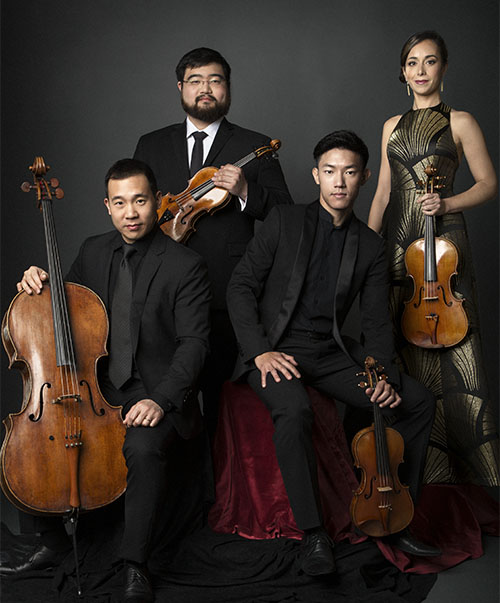Polished yet cool, the Parker Quartet (and friends) make a mixed UC debut

The Parker Quartet made its debut in the University of Chicago Presents series Friday night at Mandel Hall. Now in their 16th season, the Boston-based ensemble—named for that city’s historic Omni Parker House hotel—has performed and recorded extensively, winning a 2011 Grammy Award for its set of Ligeti quartets.
Yet while the Parkers played with admirable polish and commitment, the results were ultimately uninvolving and at times curiously detached interpretively.
The evening’s centerpiece, Leoš Janáček’s Quartet No. 1 provided the evening’s highlight. The 18-minute work takes its subtitle, “The Kreutzer Sonata,” from a Tolstoy short story of a love triangle, in which a married woman falls in love with her violin teacher leading to tragic results. As with many of the Czech composer’s finest achievements, the scenario also reflects, inevitably, Janáček’s hapless but artistically fruitful romantic obsession with Kamila Stosslova, a married woman decades younger than him.
The Parker gave a strong and dedicated performance of this roiling, dramatic work. The punchy high harmonics, eruptive outbursts and jarring contrasts were forceful and imposing.
What was missing was the extra degree of headlong passion and an idiomatic Czech quality. It was unfortunate timing that the Parker’s Janáček came just three months after the Calidore Quartet’s stunning performance of the same work at the Harris Theater. The unhinged fury and richly idiomatic Bohemian flavor that marked that memorable performance made the Parker’s rendering seem a bit too restrained and comfortable for the music.
Violist Richard O’Neill and cellist Edward Arron joined the Parkers for two string sextets that framed the evening.
The program’s major work at nearly 40 minutes—not the 50 minutes cited in the program—was Brahms’ String Sextet No. 2 in G major. As with the Janáček, Brahms’ Op. 36, has a direct romantic inspiration—a rarity in Brahms’ oeuvre—reflecting his short but intense relationship with Agathe von Siebold. Her first name forms a musical motif that recurs throughout and the score’s suffused yet deeply felt mix of ardency, pensive regret, turbulence and introspection reflect the conflicted feelings Brahms held more than decade after they parted. (The sextet was also the only major Brahms work to have its premiere in the U.S., taking place in Boston in 1866).
With O’Neill and Arron seamlessly fitting into the Parker ensemble, the playing was well blended, transparent and polished, apart from some wiry intonation from cellist Kee-Hyun Kim and a couple brief bow slips under pressure from first violinist Daniel Chong.
There were effective moments in the performance, such as the stamping peasant rusticity of the Scherzo’s trio section and the fire and ferocity all six players brought to the final pages.
Yet for the most part, this was a respectable yet rather bland performance that barely hinted at the deep wellspring of emotions in the music. An expressive reticence and lack of focus dominated the proceedings, with too much generalized playing. The low-voltage opening movement seemed on autopilot for long stretches and, while the variations were aptly contrasted, the Adagio’s main theme sounded more tepid than impassioned.
The final movement came off best in its more straightforward energy. For all the flamboyant body language and facial expressions of Chong and Kim, it was the more physically restrained Parker violist Jessica Bodner and cellist Arron whose nuanced and artfully shaded playing made the greatest contribution to this decidedly uneven Brahms performance.
The evening began with the Sextet from Richard Strauss’s opera Capriccio. Here too, while the playing was alert and elegant, the main tempo was slow to the point of stodgy. There was an apt dynamic upsurge in the central section, yet the playing overall was far too detached and cautious lacking in intensity and Straussian fervor.
The University of Chicago Presents series continues with Steven Isserlis and Robert Levin performing Beethoven’s complete cello sonatas February 21 and 22 at the Logan Center.
chicagopresents.uchicago.edu
Posted in Performances

